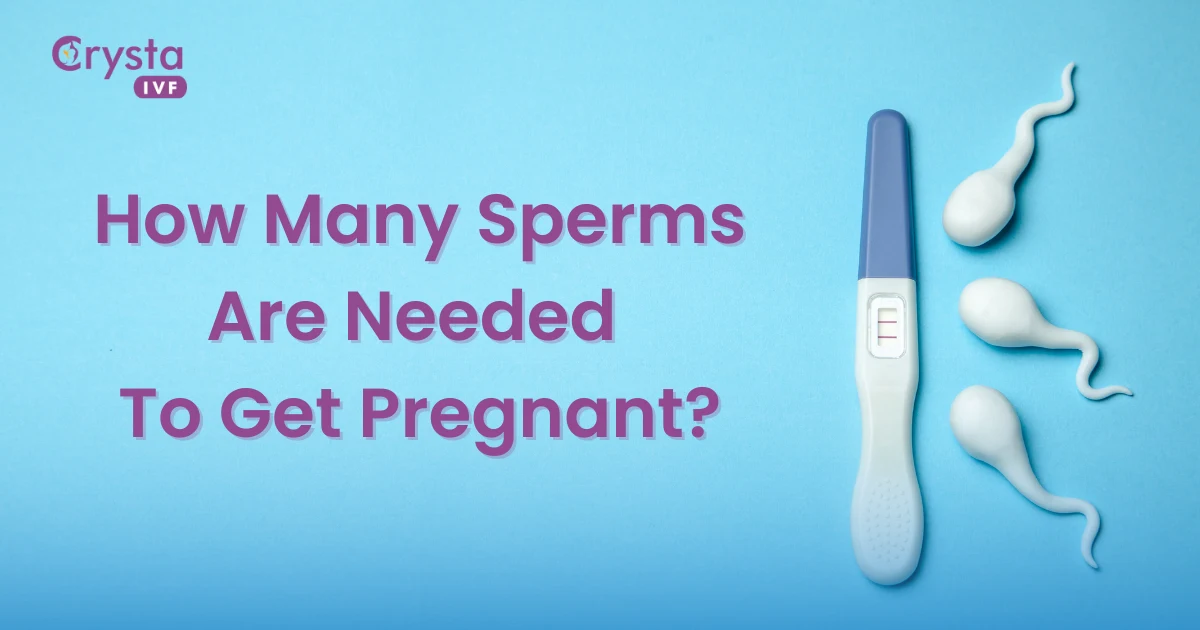Getting pregnant is a beautiful journey that every couple wants to go through at least once in a while. From experiencing the movements in the mother’s womb to delivering a healthy child, this journey never ends. However, the more exciting this journey is, the more enthralling it is to comprehend how many sperms are needed to get pregnant successfully.
So, settle in, and we will acknowledge all the significant factors related to sperms, their journey, count, health, and the ability to initiate the beautiful journey of giving another life.
But let us first identify what factors determine the needed sperm health to conceive.
Factors that determine the number and health of sperm
The number of how many sperms are needed to get pregnant, or how much semen is needed to fertilize an egg entirely depends on the health of the sperm. While healthy sperm depend on various factors, such as
Quantity
The chances of getting pregnant remain high when the semen discharged in a single ejaculate carries at least 15 million sperm per milliliter. In contrast, too few sperm in an ejaculation makes getting pregnant more difficult due to the lower sperm count required to fertilize an egg.
Structure (Morphology)
Usually, healthy sperm have oval heads and long tails competing against other sperm. Thus, the structure of the sperm is as important as their numbers in determining their health.
Movement
To reach their ultimate destination of fertilizing an egg, sperm are required to move squirmingly and swim through a female cervix, uterus, and fallopian tubes.
This art of moving flawlessly is known as motility. It is as important as a simple sperm count because pregnancy is possible with less than 40% of the sperm in the ejaculate moving, but the threshold is still recognized with the remaining 40%. As a result, the more sperm there are, the better the chances of successfully becoming pregnant.
In short, it only takes a single sperm to achieve pregnancy in a woman. However, to increase the chances of successful conception, a man needs to produce at least 15 million sperm per millilitre in a single ejaculate. When a man fails to produce the desired number of sperm, it can lead to male infertility.
If you are seeking assistance for infertility, we encourage you to consult with us. We are here to make your journey smoother and help you get one step closer to your dreams.
Causes of male infertility due to sperms
There can be endless causes of male infertility, but those that arise due to sperm health are:

Abnormal sperm production or function
Due to blockage of testicles, genetic defects, chronic health issues such as diabetes, and severe infections including chlamydia, gonorrhea, mumps, HIV, and swollen veins in the testes (varicocele) can also damage the quality of sperm.
Complications with the delivery of sperms
Complications with the delivery of sperms arise due to sexual problems including but not limited to premature ejaculation, Genetic diseases (cystic fibrosis), structural issues ( blockage in the testicle), and damage or injury to the male reproductive organs.
Other than these factors, age also plays a vital role in sperm health.
Research says that the ability of the sperm to move and the number of sperm produced entirely depend on the age of the man.
The number of healthy sperm tends to decrease after the age of 50. Therefore, to make your sperm healthy, it is your duty to make specific changes in your lifestyle when trying to conceive.
Essential tips to follow to produce healthy sperm
Yes, you heard right. You can also produce healthy sperm and start your parenthood journey at the earliest. You only have to make specific changes in your lifestyle, such as:
Maintaining a balanced diet
Include fresh fruits and vegetables that are rich in antioxidants, and avoid oily and junk food to improve sperm health.
Have a healthy BMI
Research says that obesity directly impacts sperm count and health. Thus, it is advised to maintain a healthy BMI to prevent a lower sperm count and to boost their health.
Prevent STIs
Sexually transmitted infections, such as chlamydia and gonorrhea, affect sperm health and cause infertility in men.
So, it is recommended to reduce the number of sexual partners and always use condoms when not planning to conceive.
Reduce stress
Elevated stress levels can decrease sexual function and interfere with the hormones that help produce sperm.
Research says that men who feel stressed more often have lower concentrations of sperm in their ejaculate than those whose stress levels remain balanced.
Do physical exercise daily
A daily routine of physical exercise helps increase powerful antioxidant enzymes that protect sperm from getting exploited.
What are off limits?
To make your sperm healthy and to comprehend how many sperms are needed to get pregnant or fertilize an egg, it is better to avoid those things that make your sperm vulnerable and degrade their quantity and quality.
To take care of your sperm and reduce male infertility, you should avoid the following:
Smoking
It is known that men who smoke have a lower sperm count than those who do not smoke. You can consult your doctor and get help on how effortlessly you can quit smoking.
Alcohol
Excessive consumption of alcohol can lead to reduced testosterone production and the inability to produce healthy sperm. So, if you decide to drink, do it in a limited amount after consulting with your doctor.
Excessive heat
Healthy sperm production can be obstructed by increasing scrotal temperature. Thus, avoiding wearing tight-fitting underwear is advised, reducing sitting in saunas and hot tubs, and limiting exposure to warm objects.
However, using illicit and anabolic drugs, certain medications, chemotherapy, and radiation therapy can affect your sperm quality and cause permanent male infertility. So, it is best to consult your healthcare provider to learn how to plan for a baby if your sperm are partially damaged.
When is the right time to seek help?
Making changes in your lifestyle and adopting healthy habits can help, but only to an extent. In severe cases, avoiding your reproductive health can have long-term consequences, resulting in permanent damage. Also, if you have failed to conceive for more than a year via unprotected intercourse, you have the right to seek help from a fertility specialist to analyze your reproductive health.
The fertility expert will examine your health status, and determine how many sperms are needed to get pregnant to perform in-vitro fertilization IVF treatment. It is the most commonly used ART treatment method, having assisted couples in conceiving for many years, because in IVF, the reproduction process takes place outside of the human body, in a modern laboratory.

So, if you are searching for the best IVF Centre in Delhi, Crysta IVF has the perfect solution for you. Working with advanced technology, modern labs, and a highly qualified team of professional IVF experts, we make sure every couple suffering from infertility can plan for a healthy baby and start their parenthood journey as early as possible.




